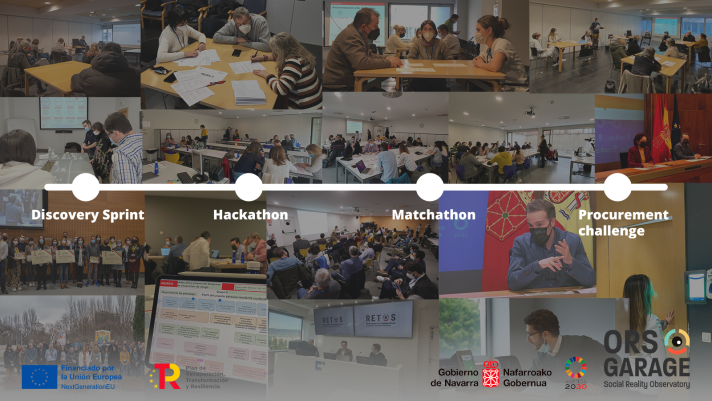In response to the public debate on conditions and care standards in residential homes triggered by the COVID pandemic, the Department of Social Rights of the Government of Navarra, in close cooperation with the public procurement department, launched a process of citizen-led innovation procurement: The ORS Garage. The process was structured into four phases, ament to capture the citizen perceptions – specifically those of users and their families, as well as frontline workers in residential cares centers – on physical, social, and emotional conditions in care settings and translate these identified needs and social challenges into negotiated procurement specifications.
Phase 1: Discovery Sprint
The objective in this phase was to capture the needs of homes for the elderly and centers for the persons with disabilities.
Phase 2: Hackathon
The hackathon convened a cross-section of participants from service providers, students, public officials, and other volunteers to collect ideas proposing solutions to the needs identified in the former stage.
Phase 3: Matchathon
The objective of the “matchathon” was to develop real-life solutions with implementing companies that are interested in participating in the specification.
Phase 4: Procurement Challenge
The procurement process was divided into two tracks:
- Quick-wins: For solutions where more advances market, solutions are already available. Here, innovation is rather focused on adaptation to context and integration into the existing management systems.
- Medium-term innovation procurement: Solutions where more R&D is needed, as maturity has not reached market stage. Here focus is on innovation procurement to trigger multi-actor alliances that strive to get ideas towards market readiness.
The aim of the ORS GARAGE was twofold. First, the project wanted to foster better care by technical support in the areas of home care robotics, digital surveillance, and geolocation technology, thus generating a traceability between the experienced needs of the residents of care facilities and the technological solutions that respond to these. Secondly, the projects aimed to promote local ecosystems of innovation by formulating innovation challenges in publicly defined markets, to accelerate the path from the need to the contracting specifications and its implementation in the residences. Impact was generated both in the short term and in the medium term. In the short term, several project canvas proposals were selected either for immediate application of market-ready solutions or strategic triggering of market readiness. In the medium term, the regional innovation actors are attracted to the missions set by citizen participation, as structured by public oversight. In that regard, the ORS Garage was given an upscaling dimension by feeding into the recently created Disability Hub, a multi-actor innovation lab aimed to facilitate encounter between welfare service users, public planners, service providers and technological innovators.
